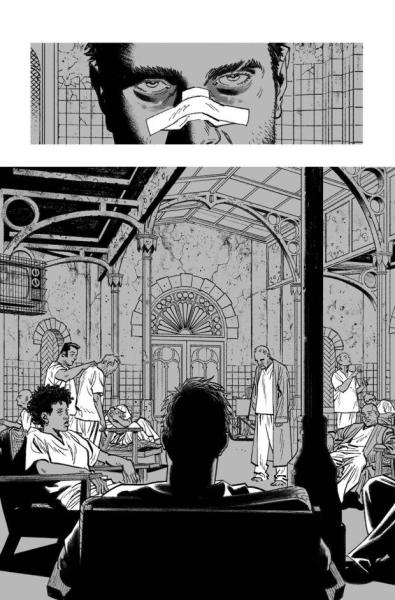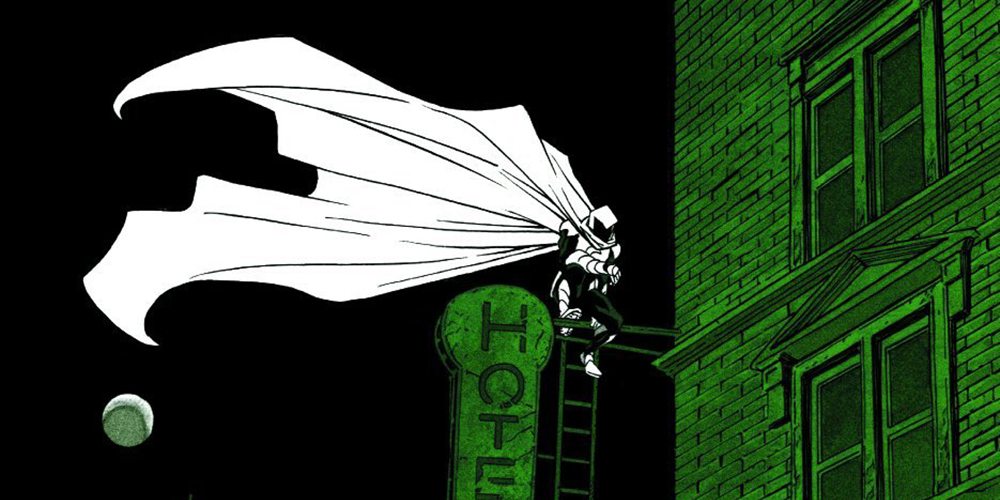
Marc Spector, AKA: Moon Knight, has been around for some time, though he’s probably one of the less well-known Marvel characters. He, like most other comic staples with any sort of longevity, has a convoluted, confusing, well-nigh-unto-labyrinthine back story that is far too involved to detail here with any sort of thoroughness. Short version: Moon Knight is Marvel’s own billionaire playboy/vigilante (also ex-CIA operative) though he, unlike the DC character of similar stature and financial means, received his mandate from the ancient Egyptian god who resurrected him.
Told you.
There’s way more to it. You can check the rest of Marc Spector’s story out here.
The basic premise of the new Moon Knight mini-series Welcome to New Egypt (written by Jeff Lemire, art by Greg Smallwood, color by Jordie Bellaire) is thus: Marc Spector, who has been missing for some time, awakens to find himself a “patient” in a horrifically brutal mental institution. He is tortured by orderlies and plagued by dreams of a bird-headed deity. His therapist insists he has been a patient at said institution since adolescence and that, while there is a Moon Knight, the hero is someone other than Spector himself. Matters are complicated by Spector recognizing other patients as figures from his supposedly delusional life; some claim to know him as well, but there’s no proof to be had.
We don’t know yet whether Spector is actually suffering from a form of delusional mental illness or if the whole thing is some plot to keep the hero confused, in pain, and out of the way. Most likely, all things being equal in comic book universe, it’s the latter, though Moon Knight does have a history of psychiatric instability.
Let’s pretend for a moment, however, for the sake of the Padawans, that it’s the former. That Marc Spector is psychotic or schizophrenic, that the Egyptian god Khonshu who resurrected him and guides his actions is actually one of the voices in Spector’s head, a product of chemical imbalance coupled with difficult life experiences.
Where does that leave us?
I imagine it leaves a good number of people uncomfortable.
Which is interesting. Because when Spector is in his Moon Knight suit, he’s a hero.
When he’s in patient scrubs, he’s a lunatic.

Let’s take a look at that dichotomy.
Actually, let me stop here for a second to make it very clear that harming others is not in any way okay. It is not an acceptable form of therapy. I am not advocating for dangerous individuals, no matter what the state of their mental health, to be wandering around endangering others, be they on the side of villainy or justice.
What I am doing is trying to point out that we, as a society, have a serious deficit in our understanding of mental illness. Of what it is, how it happens, and what to do about it. This Moon Knight mini-series reminds me of that with each new issue and I think it’s worth discussing.
Let’s start with the most pressing question: why does the idea of Marc Spector being mentally ill make people uncomfortable? Why are people so afraid of mental illness?
Because it’s terrifying. The loss of control, the loss of self? The idea that it could happen to anyone at any time. That there are so many factors that contribute, some of which we can control, some of which we can’t, and some of which we do our best to master and to which we still become victims of chance. Because it’s unpredictable. Because it can’t always be explained fully, its course can’t be plotted, we can’t predict how it may turn out in the end from case to case. It is a wild card that affects not only the individual afflicted, but everyone around her.
Here is what you need to understand, though: mental illness is not something a person chooses. It is not something they can control. It is something they would most certainly give back to the universe if doing so were a possibility. So, yes. It is terrifying. But is also very, very human. It has no respect for culture, or geographical border, or economic status. There is no way to protect yourself fully, no vaccination, no immunity.
You’d think that would make us more compassionate.
For some reason, it makes us less so.

People who are diabetic are unable, for any of a number of reasons, to produce a proper amount of insulin. I have yet to meet someone who is horrified by this, who would ever suggest someone hide the condition, try to control their blood sugar by sheer force of will. Those who are diabetic are prescribed medication, instructed in proper diet. They are diagnoses and treated and no one thinks the less of them for it.
The same is true of those with adrenal insufficiency. Hypo- or hyper-thyroid. Malabsorption. Congenital anomalies.
Mental illness, at its root, is no different from any of these other conditions. It is chemical imbalance in the brain, too little serotonin, too much dopamine, any other number of possibilities. Your skull is a cauldron of neurotransmitters and electricity. And just like with the pancreas or the pacer node in the heart, sometimes, due to something with the system, or something influencing the system from the outside, sometimes a combination of both, something goes wrong.
So I ask again: why the stigma?
Some people who are mentally ill are violent. So are a great many people who aren’t. Some people who are mentally ill are delusional. Some aren’t. I, for example, suffer from significant anxiety and there are times it’s as though I’m standing outside myself, watching my wheels spin, but because of that chemical imbalance, I’m unable to force the brakes. I know, even as I’m doing it, it’s irrational, that it makes no sense, but I can’t always take back control. If it were my lungs or my kidneys, people wouldn’t be telling me to “get a hold of myself,” or “figure it out,” or “just breathe.” When my OCD manifested as anorexia nervosa, I was told to “control myself” and to “snap out of it” and then the subject was swiftly changed. People, including ER doctors, would look right at me, a five-foot-eight human who weighed ninety-seven pounds, and tell me I was fine.
Why is my serotonin deficit different?
Why the stigma?
I keep asking because I don’t really know the answer. I know the history, certainly. I have worked as a nurse in a state psychiatric facility caring for the “hopeless” cases. When I try to talk about those experiences, or my own, many people, even in this age of every third person being on Prozac, blush and stammer and turn away.
Where’s the treatment funding? The adequate access to care? The insurance coverage? Why do we lock people up and throw away the key when some, many, might live very different lives if there were open discussion? If saying, “Yes, I do take mood stabilizers,” earned you the same understanding nod as, “I take insulin,” instead of a sneer or wide-eyed fear or denial.
Honestly, the denial is the worst.
The denial makes those who suffer from mental heath issues non-people. Non-entities. That is what happens to Marc Spector in the universe of the institution and that is what happens to those of us who struggle with mental health every day.
Mental illnesses are, by and large, chronic. They can, in many cases, be managed, but can’t, at this point, be cured. We have lived with it and we will continue to do so. It’s hard. It’s exhausting.
Here’s what you can do: listen. Remember that, like someone who is diabetic or who has cancer, we are people with a chronic illness, not an illness made manifest in a meat sack. Be compassionate. Even someone lost in paranoia and delusion can be saved by a single, kind word. Believe. We didn’t ask for this, but it’s found us and your denial can’t change that.

I don’t know what’s going to happen to Moon Knight but I know what’s happened to the patients I cared for. I know what’s happened to me. I was ashamed for a long time. I’m not anymore and I’m going to do everything I can to make sure it doesn’t happen to anyone else.
If you have questions, ask. If you need help, tell someone.
If someone comes to you, listen. Be compassionate. Believe. You’re allowed to be uncomfortable. It’s entirely valid. But don’t let it hold you back from that kind word.
Don’t let it hold you back from saving someone’s life.




<3
Love thus article. As someone with bipolar 2, what you said really resonates with me.
I do hope that this comic goes in the direction of mental illness over evil insane asylum, because that would be so much cooler.
There’s something seductive about regressing back to being my manic self, before my drugs. And if a character became more of a super hero while he regressed into his disability would be dangerous to watch.
Anyway, thank you for writing this.